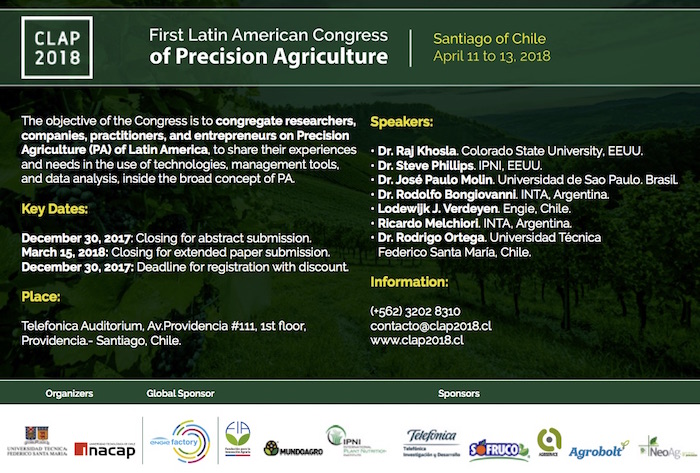Report on ACPA PA17 Conference
by Ian Yule
The 7th Asian-Australian Conference for Precision Agriculture was held in Hamilton New Zealand between the 16th and 19th of October 2017. This event was a Tri-Conference (PA17) which included the 7th Asian-Australasian Conference on Precision Agriculture, the 1st Asian-Australian Conference on Precision Pasture and Livestock Farming and the Digital-Farmer 2017. Over 500 delegates attended the overall event. The organisation of the conference was organised under the auspices of the Precision Agriculture Association New Zealand, (PAANZ). Conference chairman was Armin Werner, chair of the conference organising committee was Jim Grennell, delegates were welcomed by the chairman of PAANZ, Craige Mackenzie. Many others assisted within the organising and scientific committees. The event was managed by ForumPoint2 conference partners. The event was also generously sponsored by a number of New Zealand and international companies and organisations, as well as being supported by New Zealand’s Ministry for Primary Industries (MPI).
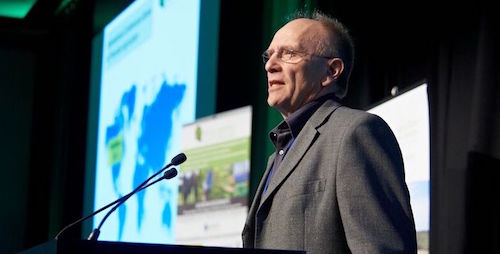
The event was deemed to be a huge success, it brought the Asian and parts of the world network of precision agriculturalists together to observe the diversity of New Zealand agriculture and horticulture, as well as exposing domestic delegates to ideas and research from overseas. The programme was perhaps more diverse than other PA conferences around the world and this reflected the increasing interest in livestock farming and horticultural crops. The philosophy of precision agriculture seems well accepted and being applied to an increasing number of food production systems. Agriculture, Horticulture, Forestry, Housed livestock, intensively grazed livestock and extensive grazing systems.
Next ACPA Conference.
Preliminary notice was given that the next ACPA, ACPA 2019 will be held at the Punjab Agricultural University between October 15 and 17th 2019. The contact person for the conference is Dr Manjeet Singh, manjeetsingh_03@pau.edu. He addressed PA17 and invited delegates to attend the 2019 event.
Next ACPA Conference.
Preliminary notice was given that the next ACPA, ACPA 2019 will be held at the Punjab Agricultural University between October 15 and 17th 2019. The contact person for the conference is Dr Manjeet Singh, manjeetsingh_03@pau.edu. He addressed PA17 and invited delegates to attend the 2019 event.
Personal Reflection on ACPA and PA17
by Ian Yule
The (Asia Australasia Conference on Precision Agriculture) ACPA was an interesting barometer in how things are changing and how different parts of the world have different problems to deal with. From a personal point-of-view I felt the New 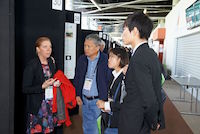 Zealand held ACPA conference was quite different to many of those I had attended over the years. The world-wide participants were mainly from Asia, Australasia, but there were numbers from the USA and Europe. The audience was actually younger than most conferences I had been to, there were more women, more women demonstrating leadership through presentations and invited keynote addresses. Many of these changes also reflect the fact that agriculture and horticultural industries in New Zealand count themselves as part of the food industry. More than 90% of New Zealand produce is exported and we appear to consider vertical integration of the food production process in order to maximise the value we can extract from our efforts more than commodity based producers. We consider that high value food with provenance and quality are paramount to our survival as an exporting nation. It is the production of high value food that appears to be driving the need for greater precision. So the nature of the NZ industry is different and it is perhaps beginning to capture the interest of both genders of a younger generation. Surely this is a very positive sign and something that should be reflected on further.
Zealand held ACPA conference was quite different to many of those I had attended over the years. The world-wide participants were mainly from Asia, Australasia, but there were numbers from the USA and Europe. The audience was actually younger than most conferences I had been to, there were more women, more women demonstrating leadership through presentations and invited keynote addresses. Many of these changes also reflect the fact that agriculture and horticultural industries in New Zealand count themselves as part of the food industry. More than 90% of New Zealand produce is exported and we appear to consider vertical integration of the food production process in order to maximise the value we can extract from our efforts more than commodity based producers. We consider that high value food with provenance and quality are paramount to our survival as an exporting nation. It is the production of high value food that appears to be driving the need for greater precision. So the nature of the NZ industry is different and it is perhaps beginning to capture the interest of both genders of a younger generation. Surely this is a very positive sign and something that should be reflected on further. 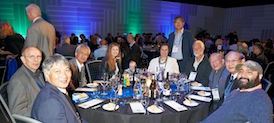
 Zealand held ACPA conference was quite different to many of those I had attended over the years. The world-wide participants were mainly from Asia, Australasia, but there were numbers from the USA and Europe. The audience was actually younger than most conferences I had been to, there were more women, more women demonstrating leadership through presentations and invited keynote addresses. Many of these changes also reflect the fact that agriculture and horticultural industries in New Zealand count themselves as part of the food industry. More than 90% of New Zealand produce is exported and we appear to consider vertical integration of the food production process in order to maximise the value we can extract from our efforts more than commodity based producers. We consider that high value food with provenance and quality are paramount to our survival as an exporting nation. It is the production of high value food that appears to be driving the need for greater precision. So the nature of the NZ industry is different and it is perhaps beginning to capture the interest of both genders of a younger generation. Surely this is a very positive sign and something that should be reflected on further.
Zealand held ACPA conference was quite different to many of those I had attended over the years. The world-wide participants were mainly from Asia, Australasia, but there were numbers from the USA and Europe. The audience was actually younger than most conferences I had been to, there were more women, more women demonstrating leadership through presentations and invited keynote addresses. Many of these changes also reflect the fact that agriculture and horticultural industries in New Zealand count themselves as part of the food industry. More than 90% of New Zealand produce is exported and we appear to consider vertical integration of the food production process in order to maximise the value we can extract from our efforts more than commodity based producers. We consider that high value food with provenance and quality are paramount to our survival as an exporting nation. It is the production of high value food that appears to be driving the need for greater precision. So the nature of the NZ industry is different and it is perhaps beginning to capture the interest of both genders of a younger generation. Surely this is a very positive sign and something that should be reflected on further. 
Some Thoughts Around Robotics and Automation
by Ian Yule
I have been to two conferences recently where ideas around robotics and automation have been discussed and very different solutions offered. Ideas around robotics and automation are continuing and there are a number of schools of thought as to how agriculture will respond. Will we go for smaller robots and robot swarms to complete tasks or will we see our major ag companies produce driverless versions of their present equipment. While attending the Agricultural Engineering 2017 conference just before the Agritechnica exhibition held in Hannover in November 2017 I was reminder about some of the fundamentals of the interactions of machines with soil. In particular the need to develop traction efficiently without damaging the soil. Prof Carl Renius of the Technica University of Munich, gave an excellent presentation on the 75 conferences on, Agricultural Engineering in Germany and Europe. I was particularly struck by a slide showing the work of Sohne, illustrating the fundamentals of soil stress under tires which dated back to 1951. This must be something that every agricultural engineer and soil scientist has been exposed to during their education.
On various occasions I have been reminded that domain expertise is very important. I know members of the society are from a number of discipline areas and I would like to encourage you to pursue those disciplines because it can add to having better informed debate surrounding the interactions we require to progress precision agriculture. A recent example springs to mind.
The problem around robotics, size capacity etc. What fits the current business model? At the PA17 conference Simon Blackmore presented his ideas around smaller robots to do a number of field tasks. At Agricultural Engineering 2017 I listened to Chris Forster from CNH Industrial talk about their vision for the future, very different and I am sure most of you will have seen that vision over the last couple of years in the press. Essentially adapting existing plant to develop driverless tractors.
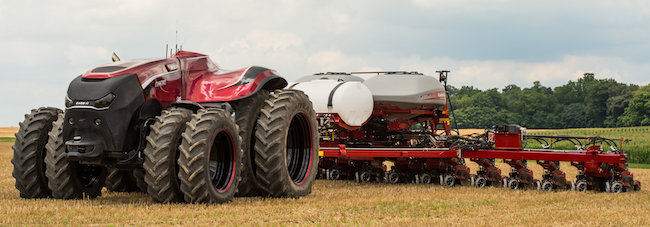
But what a great subject to have an ideas hackathon. I would have thought that all the information is there to look at the relationships between, timeliness, operational capacity, vehicle weight, cost of machine operation, cost of soil damage and compaction (based on the work initiated by Sohne 1951), soil moisture conditions, soil workability, etc etc, all are available to us to sit down and work out what would be optimum. For those in education what a great way to teach a number of concepts to your students to come up with an optimised design concept. But wait, it is all situation or site specific, well get a network of people working all those different aspects to create a greater depth of experience for those taking part. Then perhaps create viable designs for the future. Hopefully we could create an experience which was a position active design activity rather than being a collection of topics for students to learn.
Melissa Clarke-Reynolds gave a thought provoking after-dinner talk at the PA17 conference and made some interesting points around business. She suggested it was not technology that was the disruption but the business model that was no longer appropriate and was therefore disrupted. Again a great subject for some active design thinking. What would the business of robotic farming look like? How should we be marketing our food products. Clearly not something one person can answer but further emphasises the point that we need to actively engage with many domain experts in order to come up with a system solutions. It would be great if we could come up with ways to more actively engage with the younger generation of engineer, designer, agronomist, entrepreneur to help create some solutions for the future.
Technology and Science Innovation Investment in Our Primary Industry Sector
by Ian Yule
There are clearly a number of sources of funding for innovation investment in the AgriFood Tech space. Historically we used to consider the primary sector as being agriculture, horticulture, livestock and forestry, but we are now much more integrated in our thinking of farm to fork, or producer to consumer. Supply Chain and retail attracts over 3 times the level of investment compared to on-farm activities. Various mechanisms are at work at any point in time with a number of different funding sources, either private or public. A very good starting point to build an understanding of the investment scene is the AgFunder news website and the annual report which they produce in particular. The 2017 report can be found at this link.
https://agfunder.com/research/agrifood-tech-investing-report-midyear-2017
https://agfunder.com/research/agrifood-tech-investing-report-midyear-2017
As well as indicating the present level of funding and where that funding is going in terms of sectors, stage and geographical location. The report also highlights leading venture capital funds and AgriFood Tech Funds as well as highlighting some startup mergers and acquisitions. The Agfunder newsletter can be found at: https://agfundernews.com/
Governments can also play a role albeit slightly different. In New Zealand for example the Ministry for Primary Industry has released a science road map to try and inform and identify areas of science which need support and investment. The road map was put out in recognition of the important role science and technology have in achieving economic growth and environmental sustainability. Eight science and technology themes are identified as making an important contribution. One of the additional targets in New Zealand is to increase the level of industry investment. The Science Road Map can be found at:
https://www.mpi.govt.nz/news-and-resources/science-and-research/primary-sector-science-roadmap-te-ao-turoa/
Non-governmental organisations can also play a role. The Australian Farm Institute have published a report on Enhancing Private-Sector Investment in Agricultural Research, Development and Extension in Australia. A synopsis of the report including its main recommendation can be found on:
http://farminstitute.org.au/publications/research_report/rde-private-sector-investment-in-agriculture
ISPA Members Presenting at 7th Precision Ag Summit
The theme of the 7th annual Precision Ag Action Summit is “Creating Certainty during Times of Volatility,” and reflects the current state of the agricultural industry. Dr. Terry Griffin, Treasurer of the ISPA, will deliver the keynote address on “The Evolution of a Revolution: Past, Present & Future of Precision Ag” describing the infancy of precision agriculture and how technology evolved into big data in agriculture. In addition to delivering the keynote address, Griffin will moderate the panel on “Farmers Who Know Precision Ag” with two North Dakota farmers. Griffin is following in the footsteps of Dr. Raj Khosla, Founding President of ISPA, who delivered the keynote in 2017. Dr. Jordan Shockley, University of Kentucky, will present economics of precision technology. Griffin and Shockley are the Founding Leaders of the newly formed Economics Community within ISPA.
The 7th annual Precision Ag Action Summit will be held January 15 and 16 at the North Dakota Farmers Union headquarters in Jamestown, ND. http://theresearchcorridor.com/precisionagsummit2018/agenda
The 7th annual Precision Ag Action Summit will be held January 15 and 16 at the North Dakota Farmers Union headquarters in Jamestown, ND. http://theresearchcorridor.com/precisionagsummit2018/agenda
PREGA - Precision Management and Agro-Informatics Conference
PREGA - Precision Management and Agro-Informatics Conference, 20 February 2018, Budapest Hungary
Why should you attend this event?
- Learn how to reduce your production costs and optimize the use of human resources
- You can ignificantly increase your earnings with targeted nutrient delivery
- Discover the latest solutions through specific examples from domestic and international markets
- Extend your network of companies active in the Agro-Informatic industry
- With the help of more than 50 recognized professionals, be introduced to solutions that are not widespread or do not yet exist in Hungary
- Visit and interact with 20 professional exhibition booths
- Gain acess to useful information and insight that goes far beyond a mere Google search
In 2018, the PREGA - Precision Management and Agro-Informatics Conference is taking place for the fourth time, focusing on solutions and returns harvested from this year. The PREGA SCIENCE Scientific Conference, will be a part of the program and continue to facilitate knowledge sharing between practitioners and academics alike. Adhering to the traditions of the conference, renowned, foreign performers will report on the international trends and advances in precision farming.
Dr. Nicolas Temblay
Agricultural Research Scientist at Agri-Food Canada,
President of the International Precision Management Association
Viacheslav I. Adamchuk
Ph.D., P.E. from McGill University,
Secretary of the International Precision Management Association (ISPA)
From the perspective of the farmers, there is a persistent need to better understand precision farming so that these emerging technologies can be put into practice. We kindly ask the lecturers of the PREGA Conference and Exhibition, therefore, to give their presentations and make them available to the PREGA community.
While the number of plenary sessions of the Conference will be reduced this year, we will actively manage the process by dividing them into sections after their retention, thereby enabling participants to attend the sessions that are aligned with their interests.
Sections: Arable Land, Horticulture, Livestock, Food Industry
The Precision Management and Agro-Informatics Conference (The PREGA) is an excellent opportunity for valuable professional relationships to made. Those who have a keen interest in precision farming will have a professional platform to share their experiences and report on novelties and solutions to emerging issues.
CLAP 2018 : First Latin American Congress of Precision Agriculture
The First Latin American Congress of Precision Agriculture (CLAP 2018) will be held in Santiago, Chile April 11th through 13th, 2018.
The objective of the Congress is to congregate researchers, companies, practitioners, and entrepreneurs on Precision Agriculture (PA) of Latin America, to share their experiences and needs in the use of technologies, management tools, and data analysis, inside the broad concept of PA.
Key Dates:
January 20, 2018: Closing for abstract submission. (extended)
March 15, 2018: Closing for extended paper submission.
January 20, 2018: Deadline for registration with discount.
Telefonica Auditorium, Av.Providencia #111, 1st floor, Providencia.- Santiago, Chile.
More information: (+562) 3202 8310, contacto@clap2018.cl, www.clap2018.cl
Upcoming Events
More about these events online at: https://www.ispag.org/Events
24-27 June 2018 - 14th ICPA, Montreal, Canada
17-19 July 2018 - InfoAg 2018, St. Louis, Missouri, USA
20-22 June 2019 - ICCTAFA, Konya, Turkey
08-11 July 2019 - ECPA19, Montpellier, France
23-25 July 2019 - InfoAg 2019, St. Louis, Missouri, USA
15-17 October 2019 - ACPA 2019, Punjab Agricultural University, India
28-30 July 2019 - InfoAg 2020, St. Louis, Missouri, USA
Precision Agriculture Definition
Precision Agriculture is a management strategy that gathers, processes and analyzes temporal, spatial and individual plant and animal data and combines it with other information to support management decisions according to estimated variability for improved resource use efficiency, productivity, quality, profitability and sustainability of agricultural production.
The International Society of Precision Agriculture (ISPA) is a non-profit professional scientific organization.
The mission of ISPA is to advance the science of precision agriculture globally.
Contact newsletter@ispag.org to suggest content for future newsletters or visit www.ispag.org for more about the Society

